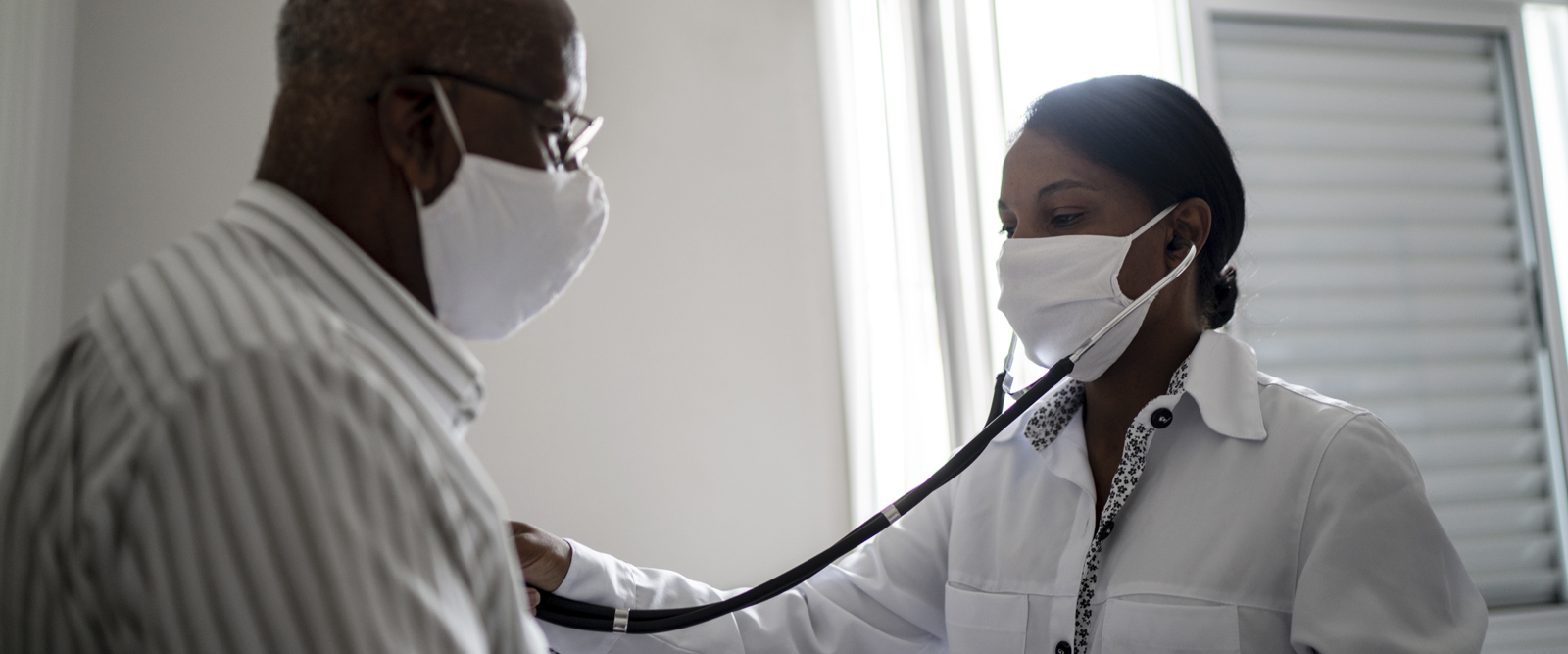What to Know About Heart Disease Risk for African Americans
A cardiologist discusses heart disease risk for African Americans and 6 things to know about heart health.

Heart disease is the leading cause of death in the United States. And for African Americans, the statistics are even more serious. According to the U.S. Department of Health and Human Services, African Americans are 30% more likely to die from heart disease than non-Hispanic whites.
“A lot of this has to do with socioeconomic factors and having access to quality healthcare,” says Dr. Christopher Irobunda, interventional cardiologist at NewYork-Presbyterian/Columbia University Irving Medical Center and the Jim Ovia Associate Professor of Cardiology at Columbia University Vagelos College of Physicians and Surgeons. “We must ask ourselves, what are the barriers to people getting quality healthcare? Do they have insurance? Does their job create added stress or limited time that impacts their health? These are all complex issues that we must consider and take into account.”
Health Matters spoke with Dr. Irobunda, who is also the vice chair for Faculty Development, Diversity, Equity, and Inclusion in the Department of Medicine at Columbia University Vagelos College of Physicians and Surgeons, to understand heart disease risk factors, why these health disparities exist, and what can be done to improve heart health.

Dr. Christopher Irobunda
1. Get your blood pressure checked each year.
High blood pressure, or hypertension, increases the risk for heart disease and stroke and is highest among African Americans—more than any other population in the world, according to the American Heart Association. When high blood pressure goes unchecked for a long period of time, it can wreak havoc on a person’s heart and arteries. The danger with high blood pressure is that the damage occurs over time, and it often goes undiagnosed.
The best way for adults 18 years old and older to monitor their blood pressure is to make sure they get it checked every year, says Dr. Irobunda. “We like to see blood pressure numbers in the 120 over 80 range. Anything higher than 130 over 80 is considered high blood pressure.” Annual checkups allow a person to keep tabs on their blood pressure and modify any habits that need tweaking in order to get it under control.
2. Understand the risk factors.
According to Dr. Irobunda, there are two different types of risk factors for heart disease: the ones we can control and the ones we cannot. “While you can’t control your age, gender, or family history, there are risk factors that can be modified like high blood pressure, obesity, diabetes, high cholesterol, smoking, and a sedentary lifestyle.”
African Americans are disproportionately affected by obesity, according to the American Heart Association, and are more likely to have diabetes than non-Hispanic whites. Both predispose someone to having high cholesterol and high blood pressure, which increase your risk for heart disease. Obesity and diabetes are complex but modifiable risk factors that deserve a team approach to treat. Working with a doctor and dietitian can be tremendously helpful.
3. Know your family history.
You can’t change the genes that were passed down to you, but you can become aware of your family history and know if you are considered high-risk. “Knowing whether heart disease runs in your family can prompt someone to pay closer attention to their heart health and start getting screened at an earlier age,” says Dr. Irobunda.
4. Chronic stress plays a role.
“Stress is something that is often overlooked when talking about risk factors for heart disease,” says Dr. Irobunda. “Those who have undergone trauma or live in an unstable environment are more likely to develop stress from an early age.” He adds that stress can lead to an increase in certain hormones like adrenaline that can elevate blood pressure. If this stress continues long-term, it can lead to permanent hypertension or a permanent heart condition.
“When people are stressed, they may begin to smoke, drink, or overeat,” says Dr. Irobunda. “They also may become hypervigilant, which can raise their heart rate and lead to high blood pressure and an irregular heart rhythm.”
There is a level of complexity to stress, and it can be challenging to address. But lowering your stress level goes a long way in improving your heart health. This includes getting enough sleep and trying to manage stress in healthy ways like through exercise and taking care of your mental health.
5. Be aware of the warning signs of heart disease.
There are different warning signs depending on the type of heart disease. For heart failure, these signs and symptoms include unexplained shortness of breath, difficulty lying down at night without feeling short of breath, and swelling in the legs. For coronary artery disease, a condition in which the arteries become narrow and constricted, one might have chest pain, chest pressure, or discomfort in the neck or jaw.
In contrast, high blood pressure often doesn’t have any signs or symptoms until it’s too late. “This is why it’s called the silent killer,” adds Dr. Irobunda. “And why it is so crucial to manage blood pressure before it gets out of control.”
6. Adopt healthy habits.
While you cannot turn back time or change your DNA, there are several lifestyle habits Dr. Irobunda says can improve heart health and reduce your risk for developing heart disease:
● Take control of your blood pressure.
● Eat a healthy diet that is low in salt and rich in potassium (for example, a plant-based diet that favors fresh fruits and vegetables over highly processed foods).
● Don’t smoke.
● Reduce alcohol intake.
● Exercise regularly for better weight control.
● Understand and manage stress triggers.
“Education is key,” adds Dr. Irobunda. “The more we can educate people about their heart health and get them access to healthcare at an earlier age, the better.”
Learn more about protecting your heart.
Christopher Irobunda, M.D., Ph.D., is a clinical and interventional cardiologist at NewYork-Presbyterian/Columbia University Irving Medical Center and the Jim Ovia Associate Professor of Cardiology at Columbia University Vagelos College of Physicians and Surgeons. Dr. Irobunda is ardently dedicated to patient care and teaching. His primary focus is individualized patient care and patient advocacy. He is focused on complex cardiac issues and other medical problems that can sometimes mask or aggravate cardiac disease. Since the summer of 2012, Dr. Irobunda has been involved in NewYork-Presbyterian’s Lang Youth Medical Program, a six-year science enrichment program to inspire and prepare students in the Washington Heights and Inwood school districts to gain acceptance into college and explore careers in healthcare. He seeks to educate the public on cardiovascular issues and ways to make everyday lifestyle modifications to help reduce these risks.
